But “put it on Facebook” is just what Kunce did. On the group called Community for Wellesley Alums in Withdrawal, which had been started a few months before, Kunce posted a message that began: “***Who has drug connections??***” After explaining her friend’s situation, she closed, “I am reaching out and activating the Wellesley Network!! Please, crosspost as necessary!!! Streptomycin. 1 gram per vial. 1 vial per day.”
Then she went to sleep.
“It was like I put out the Wellesley bat signal,” recalls Kunce. Within hours, the alumnae network had flown into action. “I posted at 11:30 on a weeknight, and by 9 a.m. the next morning, there was medication coming in.”
In the end, there was enough streptomycin—from Baltimore and Kansas City and Bangladesh—to treat not only Kunce’s friend but also several other patients at the hospital.
Wendy Creates It
The “Wellesley Network” may be as old as the College itself, but in recent years, it has gone into overdrive thanks to the rise of social media, including Facebook. Now, no matter where in the world an alumna lives, or in what year she graduated, she can instantly connect with thousands of other Wellesley grads at any moment of the day. And although Facebook is often criticized for being shallow and ephemeral, many of the relationships that have formed through the Wellesley alumnae Facebook groups have proved deep and lasting. Some of the stories, such as Kunce’s, have already become the stuff of Wellesley legend.
When Kayla Calkin ’07 founded the group Community for Wellesley Alums in Withdrawal in May 2011, she was not trying to create anything new. Rather, she was just hoping to re-create Community, the online forum that began on campus in the late ’90s, when FirstClass provided the College’s computing service.
“I had always loved Community at Wellesley,” says Calkin. “Then, in 2011, Facebook changed the formatting of its groups, making them more friendly for discussion.” In May of that year, Calkin asked on her own Facebook wall whether the College should admit trans women (students who were assigned male at birth but identify as women), an issue that was being heavily debated among students at the time. The dialogue was so vibrant that it inspired Calkin to start a Community-like forum on Facebook. “Within a day there were 200 members, and then there were 500 members. And then it really exploded.”
After the success of Community, Calkin created another group, Orchid–For Wellesley Alums in Withdrawal, a copy of the online discussion group on campus where students posted questions—mostly anonymously—about sex and sexual health. Then she created Wendy Works Out (exercise), and For Sale, where alumnae sell goods, Craigslist-style, to other alumnae. Soon after, other alumnae took up the gauntlet and created the Ivory Tower (described as “academia/grad students”), Ten Percent (described as “queers and allies”), Wendy Wears It (about fashion), Wendy in the Workplace (office etiquette), Wellesley Entrepreneurs, and, at last count, more than 110 groups for every interest under the sun, in addition to pages for specific classes and clubs.
By September 2014, just three years after Calkin created it, Community boasted more than 5,300 members—about 14 percent of all living alumnae. And even though most groups are now “secret,” meaning they are unsearchable on Facebook, new members ask to be added every day. “In May, I had about 100 people message me asking to join the day of graduation,” Calkin laughs.
Despite the group’s rapid growth, Calkin tries to keep, in her words, “a very laissez-faire attitude” about her management of it. Just as on the campus version of Community, flame wars do occur, particularly around issues related to race. And when they do, the experience can be extremely painful for alumnae. But Calkin is not interested in policing Community. “If someone says something inappropriate, someone else will just shut them down,” she says.
Yet despite the occasional fights, many alumnae are utterly devoted to these groups. According to my own unscientific poll, most readers visit them between 15 minutes and two hours per day. On some days they may check in only once or twice; on others, their browser is open all day long. Several reported that they had tried “quitting” Facebook several times but kept coming back just for the Wellesley connection.
Wendy Rescues It
When Cecilia Lam ’03 realized she had left her beloved iPad on a plane she had gotten off in Baltimore, her immediate response was to post on Community. “I was worried that if someone did find my iPad they might start peeking through my email or doing weird things with my account,” remembers Lam. “So I wrote a message on Community: ‘What can I do to make sure that someone doesn’t steal my identity?’ And I just mentioned that the plane was headed to Charlotte.”
Anna Basevich ’06 was in the Charlotte airport, killing time on Facebook while waiting for a connection, when Lam’s post popped up. “Cecilia, do you know what flight # it is?” she wrote. “I’m at the Charlotte airport right now and could try to meet it if it gets here before my flight takes off.”
Lam replied instantly with the flight and gate information and her seat number, while dozens of other Wellesley alums, watching things unfold in real time, cheered them on. “I made a run for it,” remembers Basevich, who arrived just before the flight was about to take off again. “I said, ‘Look, my friend left an iPad on this very plane on the last flight’ … and the gate agent ran on the plane and came right back out with it.”
On April 22, 2013, at 9:35 p.m., just 22 minutes after Lam’s appeal, Basevich posted, “I’ve got it!” And the online crowds went wild.
Although Basevich had told the gate agent that Lam was a friend, in fact, the two had never met. “We didn’t know each other,” says Lam. “But because we both went to Wellesley and were both on Community … you just assume the best from everyone.”
When the iPad arrived at Lam’s home in San Francisco via FedEx a few days later, she wrote a note on the screen, photographed herself holding it up, and posted it online for Basevich—and the rest of Community—to see. “Thank you, Anna! Thank you, Wellesley and Community!”

Wendy Solves It
This past June, Lauren Rankin ’01 posted a link to a 10-karat gold Wellesley signet ring that was up for auction on eBay. “I get an auto-alert every time a piece of Wellesley jewelry goes up for sale on eBay,” explains Rankin. This ring was unusual, though, in that it was a size 5—so small that it would only fit the pinkie finger of a person with very small hands. It was engraved with the initials RMH and the class year ’69.
Another alumna replied to Rankin’s post that she was curious to know more about RMH, and within a few hours, Rankin and a couple of other Wellesley sleuths were on the case. A quick search of the alumnae directory turned up only one RH listed with the Class of ’69: René Haas. Then Google located one René Haas of Corpus Christi, Texas. She listed her education as Wellesley College.
“That raised a red flag for me,” remembers Rankin. “So I sent her a blind email.”
“I’m one of those manic people who has to read everything that comes into my inbox,” says Haas. “If I had been like anyone else, I’m sure I wouldn’t have opened it.” But she did open it, and suddenly the past came flooding back to her. It was 30 years ago, in the fall of 1984, and Haas was a newly elected state district judge and a divorced mother of two small children. One night, she came home to find that her house had been burgled.
Although the thief, a well-known cat burglar in the area, was eventually caught and sent to prison, most of Haas’ things were never recovered. Seeing Rankin’s email and a photo of the ring, Haas knew it had to be hers. “It was obviously my ring,” says Haas, who has a size 5 ring finger. The eBay seller was a pawnbroker in her own town.
After much back-and-forth with Rankin, Haas had the Corpus Christi police confront the seller. At press time, she was awaiting a trial in small claims court, set for November, for the return of the ring. The dealer is likely to have met his match in Haas, who also had a very successful career as a trial attorney.
Wendy Survives It
Danielle Norris-Gardner ’02, remembers vividly the morning, a little over two years ago, that she started the group Wellesley Women Who Will Survive Parenthood. “I was covered in poop,” she says. “It was a diaper change gone horribly wrong, and I thought, ‘I am never going to be able to survive this with my sanity intact.’”
At the time, Norris-Gardner was living with her husband and their 1-year-old daughter in a dusty town in rural New Mexico. “There was no one in town I could connect with, and all my support was an airplane ride away,” she says.
So after cleaning herself up, Norris-Gardner logged on to Facebook and started the first online parenting group by adding 30 of her Wellesley friends. The name of the group was a play on the College’s motto—providing “an excellent liberal-arts education for women who will make a difference in the world”—and the banners that festooned campus lampposts in the early 2000s. The “Women Who Will …” banners carried the names of illustrious alumnae—a secretary of state, an astronaut, scientists, writers, and many others. That simple, alliterative phrase seared itself into the psyches of the students of the period, encouraging them to shoot for the moon, but also causing many to think that their own accomplishments hadn’t quite measured up to the Wellesley ideal.
“When you’re sitting at home, covered in poop, you don’t feel like sending that in to class notes,” says Norris-Gardner. “‘Hey, I survived another day, and tomorrow will be exactly the same!’” Of course, she was not alone. The Wellesley Parenting Group, as most people call it, now boasts about 1,600 members, and they are perhaps the most active and devoted members of all of the Wellesley Facebook groups—even holding meet-ups on campus and in Washington, D.C.
“This group has been such a lifeline for so many,” she says. “Within minutes of a post, there are hundreds of your Wellesley sisters there to lift you up, whether you are dealing with childhood illness or miscarriage or unspeakably difficult life events. It makes it all more bearable to know there are hundreds of virtual hugs out there.”
Wendy’s Got Your Back
One young alumna received a lot more than virtual hugs from the members of the parenting group when she reached out for her own lifeline early one morning. After months of emotional and financial manipulation, her husband “crossed the line,” says the alumna, “and became physical.” She also lacked a good support network in her rural community, and the one person to whom she had reached out for help replied, “Was it a hard push or a soft push?”
“Does it matter?” she appealed to the group. “I am very confused.”
Immediately, alumnae posted words of support and validation, but also offered the phone number of domestic-abuse groups in her area, legal advice, and emergency funds.
“I expected there to be a lot of judgment, a reaction of ‘What is wrong with you? Why would you tolerate that?’” says the alumna. “As a Wellesley woman, I thought I should not be experiencing difficulties in my marriage, I should not be experiencing abuse. But that wasn’t the response. There was so much love and support. People offered to find a safe place for my son and me to stay. Someone offered to come and pick me up. Others reached out with their contact info and said, ‘Please call and talk to me day or night.’”
In the following hours and days and months, the alumna returned to the group again and again. It helped her rebuild a relationship with her husband on a more equal footing. And it celebrated with her recently when she started work on her master’s degree.
That morning when she posted on the group was a tipping point in her life, she says. “One of the comments that day was ‘imagine the shadows of hundreds of Wellesley women behind you.’ And I really did.” She continues to work through differences with her husband and has even started her own Facebook group for Wellesley Parents Navigating Relationships, which has more than 80 members. Since then, she says, “there’s been a change in me, I feel stronger and more independent and able to assert myself. I know I’ve got support to leave if I have to.”

Wendy 2032
Last October, when New Hampshire resident Sarah Gillis Harrison ’97 posted on the parenting group that her 3-year-old daughter Miranda was headed to the emergency room for “peeing red,” she was looking to be reassured that it was just a UTI. But when the results came back as cancer, Harrison found herself unable to cope. “I couldn’t function. I couldn’t talk to my husband about it. I was having a very bad reaction,” she says. But she could post to the Wellesley parenting group and did, every day, sometimes several times a day.
Anne Radford ’98, who lives in Georgia, was following Miranda’s story on Facebook and watched as Harrison started falling apart online. “Those of us who happened to see what was going on the day her daughter was diagnosed felt the need to support her,” says Radford. So she created a spin-off group, “Miranda 2032,” named for the year that Harrison’s daughter would graduate from Wellesley. Here was a dedicated space where Harrison could post updates on Miranda’s condition, as well as questions and concerns, or just share her constant worries and periodic joys. It soon had more than 250 members.
From then on, for whatever need, through 10 hospitalizations and 10 months of treatment, a Wellesley alumna would appear. Rebecca Padnos Altamirano ’98, who lives in California, became Harrison’s “social secretary.” “Sarah told me that what she needed most was ‘adult babysitting,’” Altamirano explains, “that if she was around other people she would ‘rise to the occasion’ and not ‘freak out all the time.’” So, during Miranda’s two-week radiation treatment, Altamirano checked in on Harrison every morning and organized a visitor from the New Hampshire Wellesley Club to visit her every afternoon.
The “Band of Angels, ” as the members of the group—all alumnae—dubbed themselves, sat with Harrison during the six-hour surgery to remove Miranda’s cancerous kidney. They helped her navigate the hospital and insurance bureaucracy. On birthdays, they sent balloons. At Christmas, they sent carolers. And from every state in the nation and half the countries in the world, they sent postcards and presents, clothes and gift certificates for eating out.
“We wanted to have a group like the Band of Angels to bring her joyful moments during a time that would be kind of tough,” Radford says.
Those joyful moments appeared all year long, between the surgery and the radiation, the chemo and the hair loss, right through to this past September, when, in a single week, Miranda celebrated her fourth birthday and cleared her first follow-up scan with “no evidence of disease.” Her rainbow birthday cake read: “Miranda 2032.”
Wendy Serves
What is the special alchemy that happens on the Wellesley Facebook groups that not only make them lifelines of support but quite literally life-savers?
Kayla Calkin recounts the story of an acquaintance who tried to start a for-profit internet space that would function like the one she had started with Community. “I told him I don’t think it would work anywhere else but at Wellesley,” she says. “We have the shared experience of going to a women’s college, and having that first-year lecture where you’re told that being a Wellesley alum is a lifelong commitment and you need to value each other and consider yourselves sisters. … It really has been true in my life. It is a phenomenon. I will always go out of my way to help any Wellesley alum no matter what.”
“Wellesley is a self-selected community,” says Altamirano. “The values that Wellesley teaches—even the motto—appeal to a woman who is aware of the broader community and interested in social action and helping people.”
In August, a new group appeared on the Wellesley Facebook roster that more formally answers the College’s call to serve. It is called Sed Ministrare, and, according to founder Sarah Lincoln ’06, she was inspired to create “a group for Wellesley alums to both give and receive,” after she learned about an alumna who had gone days without eating while waiting for her food stamps to arrive.
While groups such as these have only been around a short time, many alumnae have already come to rely on them for advice on almost every aspect of life, from negotiating a promotion at work to navigating problems with a partner or child. And although these groups exist only in the virtual world, the Wellesley network on Facebook is very real—and only a click away.

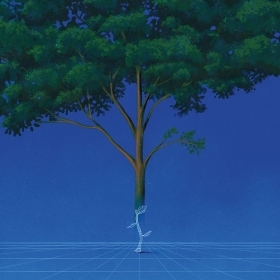
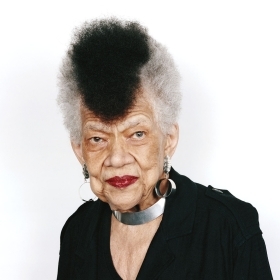
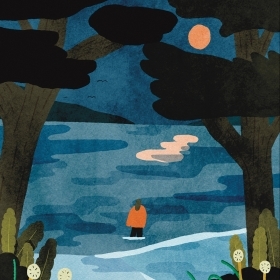
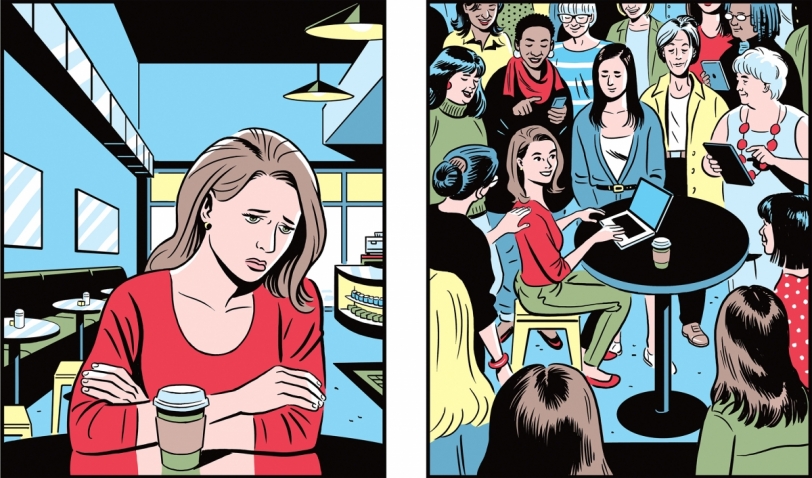




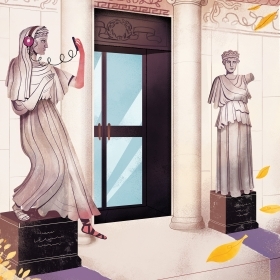

We ask that those who engage in Wellesley magazine's online community act with honesty, integrity, and respect. (Remember the honor code, alums?) We reserve the right to remove comments by impersonators or comments that are not civil and relevant to the subject at hand. By posting here, you are permitting Wellesley magazine to edit and republish your comment in all media. Please remember that all posts are public.